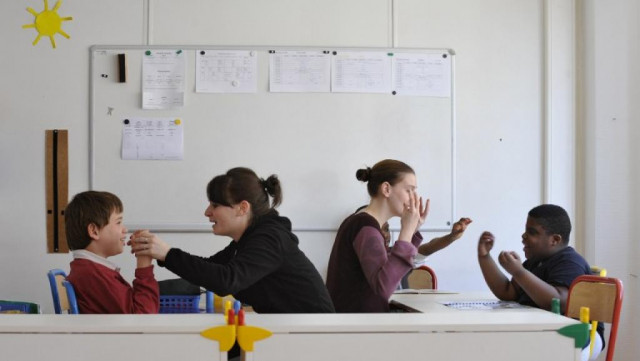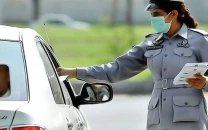‘Pakistan needs to change its disability laws’
ASDWT founder says these children need to be included in mainstream schools

PHOTO: AFP
Observers say even doctors in Pakistan don’t know much about this disorder, while the treatment and other facilities, including special schools for the children suffering from it are also rare.
This year, the White House will be lighted up blue for the Autism awareness, but no such wide-scale marking of the event is planned on the government level.
There are individuals like Rukhsana Shah who faced this disorder with her only son and made it a mission to create awareness about the condition. She helps other such parents and fights public and private institutions for the rights of autistic children.
Karachi's haven for the differently-abled needs help
Talking to the media, Rukhsana Shah, who founded the Autism Spectrum Disorders Welfare Trust (ASDWT), said the symptoms of the Autism include: difficulty in mixing with other children; insistence on sameness; resists changes in routine; inappropriate laughing and giggling; no fear of dangers; little or no eye contact; sustained odd play; apparent insensitivity to pain; echolalia (repeating words or phrases in place of normal language); prefers to be alone; may not want cuddling or act cuddly; spins objects; not responsive to verbal or non-verbal cues; acts as deaf; inappropriate attachment to objects; and difficulty in expressing needs.
She said parents of autistic children specially mothers should be trained because an autistic child spends most of his time with his parents and only a couple of hours with the therapist. So, importance should be given to parents training so that they can manage their child well.
She termed these students as super smart having extraordinary abilities. “They just have a different way of processing information. They could be highly good with music and computers. However, currently, there were no specific services being provided to these super smart children at the government-level.”
Deaths up sharply among people with autism: study
She said they were included with children having intellectual disability which was not right. “These children are needed to be included in the mainstream schools and for that proper legislation needs to be passed so that it becomes compulsory for all schools to accommodate ASD children,” she added.
Talking about flaws in country’s laws, Rukhsana Shah said that developmental disorders are mentioned neither in the Mental Health Ordinance 2001, nor in the National Trust for the disabled. On the other hand, the Indian National Trust Act 1999 and laws and in many other countries specifically mentions “Welfare of Persons with Autism, Cerebral Palsy, Mental Retardation and Multiple Disabilities”.
India is further increasing the number of recognized disabilities from seven to 19, while in Pakistan, there are only four categories in the Disability Acts of 1981, 2012 (Punjab) and 2014 (Sindh) — visual and hearing impairments, physical disabilities and mental retardation.
Asma Ahmed, Senior Clinical Psychologist, ASDWT said that autistic children’s life could be improved by training, love and care.
She said the government should work for development of a facility, specifically for autistic teenagers as currently no school in Lahore is taking these children after the age of 13 which is a big dilemma. “This is a transitional phase in child’s life and he’s left at home which worsens the situation for parents as well as child,” she added.
Published in The Express Tribune, April 2nd, 2017.



















COMMENTS
Comments are moderated and generally will be posted if they are on-topic and not abusive.
For more information, please see our Comments FAQ